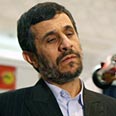
Ahmadinejad says nuclear summit 'humiliating'
'Your gift to the world is a nuclear bomb while Iran presents humanity,' Iranian leader says of US ahead of nuclear security summit. Russia's Medvedev warns that energy sanctions on Tehran could lead to 'humanitarian catastrophe'
WASHINGTON - Iranian President Mahmoud Ahmadinejad condemned a nuclear security summit which opens in Washington on Monday as humiliating to humanity.
US President Barack Obama is hosting the summit, which is focused on preventing nuclear terrorism but where world leaders are also set to discuss his push for new sanctions against Iran's atomic program.
"World summits being organized these days are intended to humiliate human beings," Ahmadinejad told delegates at a domestic tourism industry event, according to IRNA news agency.
Iran was not invited to the summit, which is being attended by leaders of China and Russia whose consent will be required to impose new sanctions which Obama wants agreed in the coming weeks.
Ahmadinejad had harsh words for politicians who claimed to represent the international community: "These foolish people who are in charge are like stupid, retarded people who brandish their swords whenever they face shortcomings, without realizing that the time for this type of thing is over."
Iran has said it will complain to the United Nations about what it sees as Obama's implied threat to attack it with nuclear weapons. Addressing the United States, Ahmadinejad said: "Your gift to the world is a nuclear bomb while Iran presents ... humanity."
Iran says sanctions will not force it to stop its pursuit of nuclear technology which it says is entirely peaceful. The West fears it is seeking to gain nuclear weapons.
Russian President Dmitry Medvedev said in an interview aired Monday that while he agreed sanctions were needed to halt Iran's nuclear drive, they should not crack down on its oil trade.
'We should carefully monitor nuke program'
Medvedev, who will arrive in Washington later Monday for the two-day summit on nuclear security, warned that energy sanctions on Iran could lead to "humanitarian catastrophe," despite the popularity of such measures among US lawmakers.
"If we're talking about energy sanctions, I'll tell you my opinion. I don't think on that topic we have a chance to achieve a consolidated opinion of the global community on that," Medvedev told ABC News television.
"Sanctions should not be paralyzing. They should not cause suffering."
The handpicked successor of ex-president and current Prime Minister Vladimir Putin said Iran's nuclear program "is not transparent" and should be monitored carefully.
If world powers slap a fourth round of UN sanctions on Iran, they should be smart and effective because previous ones often have not worked, he said.
"They should not lead to humanitarian catastrophe, where the whole Iranian community would start to hate the whole world," Medvedev added.
Russia has joined an effort led by Washington to toughen sanctions within weeks on Iran over what the United States and its allies say are efforts to produce nuclear weapons under the cover of what Iran insists is a civilian energy program.
"Are they pursuing the nuclear weapon or not? I don't know," Medvedev said. "But we should carefully monitor it."
He said Iran's efforts to enrich uranium on its soil despite an offer by the major powers to supply the fuel "could be considered as at least the desire to enter into conflict with the world community."
The ABC interview was conducted on Friday, a day after Medvedev and Obama signed a nuclear arms reduction treaty in Prague. It first aired on Monday.
"Medvedev told "Good Morning America" that he would consider withdrawing from the nuclear disarmament treaty should the US missile defense program in Europe create an "imbalance."
The Russian president said the two countries negotiated specific language, or a "formula," in the preamble of the new START treaty that states there is an "interconnection between the strategic offensive arms and missile defense."
"So if those circumstances will change, then we would consider it as the reason to jeopardize the whole agreement. That doesn't mean that because of that rule, if the American side starts to build up the missile system the treaty would automatically lose its power," Medvedev said.
The new US-Russian nuclear arms treaty may have a problem getting the vote of at least one independent US senator, as well as Republican lawmakers.
Sen. Joe Lieberman, a Connecticut independent, said that America's nuclear arsenal must be modernized. That might be difficult if President Barack Obama keeps to his pledge not to build new warheads or engage in underground testing.
Lieberman said he doesn't think the new treaty would get the 67 votes needed for ratification unless there were “major changes” to it.
AFP, Reuters and AP contributed to the report










